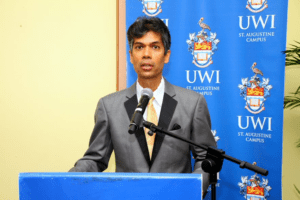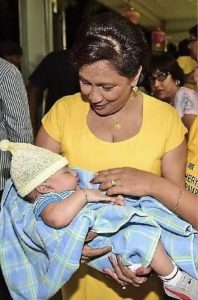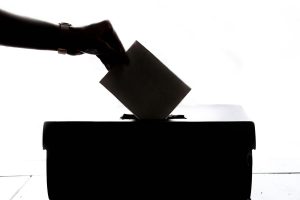‘Tie the heifer loose the bull’

MALE underachievement.
This is a crucial issue affecting many males in Trinidad and Tobago, the Caribbean and the rest of the world. Many can speak or write about the issue of male underachievement
but it’s difficult to search for answers and solutions to this endemic problem.
The data on male underachievement is obvious – boys are outperformed by girls in the
SEA, CSEC and CAPE examinations. At tertiary levels – more girls are enrolled and even
in areas previously monopolised by males like Engineering- the girls outperform the
boys. Statistics show that more males are in prison than females – a direct result of this
dilemma in society.
In re-awakening the man inside, we need to be mindful of the fact that not all men and
boys are underachievers, prone to criminal activities or violence. When this is taken into
consideration, it makes the problem more realistic and so we can consider viable
solutions and answers.
Secondly, the methods of re-awakening the male in our society would have to be different. Why? Boys and men in Trinidad and Tobago are nurtured in such diverse backgrounds it is natural that they would react or respond differently to any given
situation.

The various ethnic groups (Portuguese, Chinese, Syrian, East Indian and African)
coming from diverse religions, classes, occupations and geographical locations and therefore would acquire different masculinities and identities as dictated by their status
and backgrounds.
Therefore, this re-awakening must entail a search for answers and solutions to be implemented. We need to delve into the causes, symptoms, and impact on society of male underachievement and the links to masculinity.
Let us look at some of the known causes of male underachievement. There are numerous
causes of male underachievement. One of the major reasons for this social malady is the
absence of proper male role models.
These may be the absentee fathers in many homes so as a substitute for male figures other role models are found e.g. on television and movies, music industry or gang leaders in some communities.
The family structure is fragile.
These artistes, actors and gang leaders regularly display eccentric behaviours and
reckless antics. Often they use illegal or legal drugs and their controversial public
statements are internalised by males in Trinidad and Tobago as being the ‘norm’, ‘cool’,
‘hip’, strong, powerful, macho and glamorous.
Furthermore, the macho image associated with these Hollywood or Bollywood stars and
gang leaders directly contributes to male underachievement. How? This macho image is
often one that portrays a carefree life of wealth, partying, sexual freedom and abuse of
legal and illegal drugs. Yes, the macho male in this environment is portrayed as having
many friends, being popular and attracting a host of beautiful women!
So any young man who patterns his life on this macho image will eventually possess low
self-esteem and limited goals in life. It is obvious that if the goal is to be macho then the
young men would not be keen on studying, attaining academic qualifications or attaining social mobility by hard work.
The conditions at home are important in understanding this phenomenon. At home girls
are supervised by parents but boys are allowed to lime. Thus, this strict environment will
make the girls more inclined to study. In fact, two researchers used the expression “tie the heifer loose the bull” to explain this unequal treatment.
A Jamaican researcher, Barry Chevannes, noted that most of male socialisation takes places on the street, where the prevalent behaviours and values are opposite to those in the school. Chevannes also noted that street survival is the name of the game and thus education in schools does not serve the male.
Also, there is a difference in personality and learning orientation in boys. Boys develop
later than girls. Boys are supposed to be tougher and unfortunately stereotyped as being
involved in fights, hard-hearted and rebellious.
There are exceptions as some excel in sports. It’s a sad reality but for some boys- reading books, being more careful, caring and cautious would be considered feminine.
And on the other side- girls read earlier in life and are better in languages which is the gateway to academics.
Dr Jerome Teelucksingh is an activist. He initiated the inaugural observances of International Day for the Elimination of Violence Against Men and Boys (January 31) and World Day of the Boy Child (May 16). He has made academic presentations at tertiary institutions including Harvard University and Oxford University.
See other articles by Dr Jerome Teelucksingh on AZP News:
The Blackest Thing in Slavery wasn’t Slaves
The Importance of Emancipation Day
Tobago’s Working Class in the 1920s, 1930s
Are Humble Caring Fathers Champions?
Influencing West Indian Masculinity
Defining Caribbean Masculinity
Is Monogamy Encouraged in the Caribbean
Naps Girls: From Humble Beginnings to Excellence
US Media Creates Cultural Dependency in the Caribbean
Bloodless Revolution to Save Lives in Developing Countries
The Need for a Social and Moral Revolution
The Law of Supply and Demand in Developing Countries
End the Dependency for Developing Countries
T&T Carnival and the Emperor’s New Clothes
The Influence of Labour on Caribbean Integration
The illusion of political Unity
Presbyterians in Trinidad: Humble Missionaries, Local Workers
Religious Plurality: Curse or Blessing
Caribbean Youth Need Optimism, Patriotism
Rethinking Identities in Caribbean, Latin America
November 19: All Inclusive International Men’s Day
Should International Agencies be Blamed for Unemployment
A Need to Observe Word Unemployment Day
An Ideology for the Trade Union Movement
The Man who Couldn’t be Prime Minister
Social Outburst vs Social Revolution
Challenges of the Men’s Movement
If George Floyd was Denied Parole
The Meaning of Indian Arrival Day in T&T
International Men’s Day – A Way of Life
Wounds that cause school violence
May Day: A Time for Solidarity, Strength
Who Coined the Term ‘Black Power’
The illusion of political Unity
Presbyterians in Trinidad: Humble Missionaries, Local Workers
Religious Plurality: Curse or Blessing
Caribbean Youth Need Optimism, Patriotism
Rethinking Identities in Caribbean, Latin America
November 19: All Inclusive International Men’s Day
Should International Agencies be Blamed for Unemployment
A Need to Observe Word Unemployment Day
An Ideology for the Trade Union Movement
The Man who Couldn’t be Prime Minister
Social Outburst vs Social Revolution
Challenges of the Men’s Movement
If George Floyd was Denied Parole
The Meaning of Indian Arrival Day in T&T
International Men’s Day – A Way of Life
Wounds that cause school violence
May Day: A Time for Solidarity, Strength
Who Coined the Term ‘Black Power’
![]()














